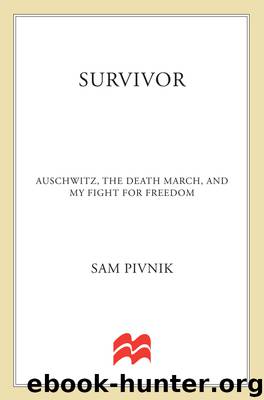Survivor by Sam Pivnik

Author:Sam Pivnik
Language: eng
Format: epub
Publisher: St. Martin's Publishing Group
Plan of Fürstengrube. Based on a drawing by Hermann Josef, 1965.
None of us realised our new situation or fully grasped its significance. We were now part of a labour force, albeit slave labour, and were doing our bit for the German economy. While back in Berlin, Hermann Göring spoke of guns, not butter, the desperate tunnels of Fürstengrube were churning out coal to be trained to Monowitz where the production plant carried out the necessary chemical processes. The SS charged four Deutschmarks a day for an unskilled labourer like me; six marks for a skilled man. None of this of course appeared as wages and very little was used to maintain the mine. I suppose the SS attitude was that they had a virtually inexhaustible supply of slave labour and any one of us could easily be replaced.
They had started serious work at Fürstengrube in the summer of 1943 and Jewish labourers had built the camp under the guns of the SS. Within weeks, they were shipped out and new people like us were brought in from Auschwitz I and from Birkenau. And there were Russians there too, prisoners of war from Stalin’s Red Army. There was an irony here that was not lost on us Polish Jews. In 1939 the Wehrmacht had overrun Poland so quickly because they knew their forward units would not tangle with the Russians who had already agreed to carve my country up with the Germans. The shoe was on the other foot now and these men had been imprisoned by their former allies.
Actual living conditions in Fürstengrube were not very different from Auschwitz-Birkenau. For all the barracks were newer, they were still spartan and extremely basic. Ours was a rectangular building in the centre of the compound, specifically housing skilled workers. Here was the building school with shoemakers’ and tailors’ workshops next door. We were packed like sardines in three-tier bunks and the ‘beds’ consisted of a straw-filled sack-cloth palliasse which formed a mattress. The single blanket was made of burlap, but it felt like it had been knitted from barbed wire. The food was the same too – breakfast was the usual ersatz coffee, made of barley or acorn. That was used to wash down a single slice of bread and piece of sausage. More coffee in the evening when we had the watery soup made from potatoes or turnips.
My first job was not unlike the one I’d left behind – welcoming new arrivals. Yet it was in another way totally different. There were no cattle-trucks here, no Rampe and no one was passing in on their way to the gas chambers. Under the orders of the ever-watchful SS guard commander, I opened and closed the main gate at the north-east corner as trucks and SS vehicles went in and out. After a few days, there was another selection. As usual, the standing in line, the pointed finger, the sheer randomness of it all. But as things turned out, this one wasn’t actually random at all.
Download
This site does not store any files on its server. We only index and link to content provided by other sites. Please contact the content providers to delete copyright contents if any and email us, we'll remove relevant links or contents immediately.
| Africa | Asia |
| Canadian | Europe |
| Holocaust | Latin America |
| Middle East | United States |
Fanny Burney by Claire Harman(26603)
Empire of the Sikhs by Patwant Singh(23086)
Out of India by Michael Foss(16853)
Leonardo da Vinci by Walter Isaacson(13336)
Small Great Things by Jodi Picoult(7143)
The Six Wives Of Henry VIII (WOMEN IN HISTORY) by Fraser Antonia(5515)
The Wind in My Hair by Masih Alinejad(5095)
A Higher Loyalty: Truth, Lies, and Leadership by James Comey(4964)
The Crown by Robert Lacey(4817)
The Lonely City by Olivia Laing(4802)
Millionaire: The Philanderer, Gambler, and Duelist Who Invented Modern Finance by Janet Gleeson(4478)
The Iron Duke by The Iron Duke(4356)
Papillon (English) by Henri Charrière(4274)
Sticky Fingers by Joe Hagan(4199)
Joan of Arc by Mary Gordon(4112)
Alive: The Story of the Andes Survivors by Piers Paul Read(4033)
Stalin by Stephen Kotkin(3966)
Aleister Crowley: The Biography by Tobias Churton(3640)
Ants Among Elephants by Sujatha Gidla(3467)
